Iran Government To Ban “Unauthorized” Selling Of VPNs

Iran’s government has decided to act against those selling VPNs and circumvention software to people, as a measure to further restrict access to the Internet.

Iran’s government has decided to act against those selling VPNs and circumvention software to people, as a measure to further restrict access to the Internet.
The Judiciary department in collaboration with ministry of communications will take legal action against "unauthorized sellers of the VPNs and circumvention tools," local media reported.
ISNA news website that published the news on Wednesday did not say who made the decision, however; many believe it could have been ordered by the Supreme National Security Council, or one of the intelligence services.
Since the beginning of protests in mid-September, the government has been severely restricting Internet access in general and access to popular social media platforms, such as Instagram, WhatsApp and others.
The government is extremely nervous that people use the Internet and social media to share news and images about protests, possibly motivating a larger segment of the population to join demonstrations.
However, restricting access also hurts internet-based businesses. Reports say up to 10 million people's livelihoods may be adversely affected by government’s Internet access denials and its ban on social media platforms.
This has prevented Internet-based businesses from marketing and selling their products and services. Economists believe it will have alarming repercussions for Iran's economy while the country is suffering from high inflation and a recession.
Officials, including Supreme Leader Ali Khamenei, have repeatedly criticized free access to the internet in recent years, and have been trying to prevent the free flow of information by expanding the "national intranet".
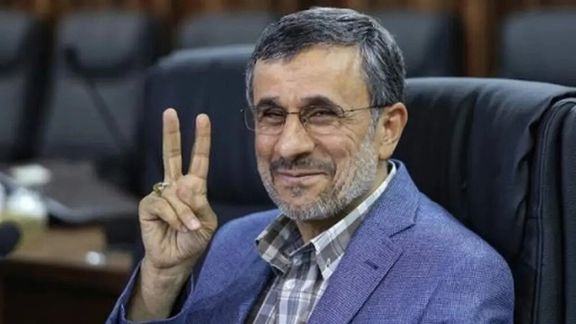
Dear reader, this item mistakenly was based on a video that unfortunately was old and we apologize for the error. However, we will not delete the item for now.
-----------------------------------------------------------------------------------------------------------------------------
Iran’s former President Mahmoud Ahmadinejad, who had kept silent during the recent anti-regime protests, has finally criticized the crackdown on protesters.
In a video published, Ahmadinejad said “the money spent on suppressing people should be spent on solving the country's problems.”
He also mentioned that claims by “corrupt gangs” of security and intelligence organs, who only want to “bug” people, are not valid because it is not possible to label everyone “anti-regime”.
Elsewhere in his remarks, he called on Islamic Republic officials to listen to people’s demands and solve their problems, saying otherwise “we may not have a chance to make up for it tomorrow.”
Mahmoud Ahmadinejad was conspicuously nowhere to be seen within the past four months as Iran was experiencing its biggest uprising in more than four decades.
The camera-loving populist politician fell out with Supreme Leader Ali Khamenei in May 2011 over firing the leader's favorite intelligence Minister Heidar Moslehi, and even refused to go to work for a couple of weeks.
Since 2017, Ahmadinejad has often been critical of the regime and spoken about change. He has separated himself from the government as much as he possibly could, but lack of a large grassroot support left him isolated.
With his background, it is unlikely that the youngsters, who have taken to the streets, would see him or his vaguely defined populist plans as part of the bigger picture they have in mind for Iran's future.
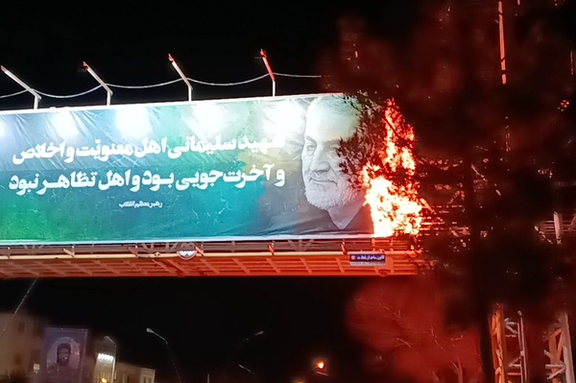
On the third death anniversary of ex-IRGC commander Qassem Soleimani’s death, people in different parts of Iran burned his statues and posters, including in his hometown.
Videos received by Iran International show people setting fire to Soleimani’s banners and posters in Tehran, Karaj, Zarinshahr, Rafsanjan, and his hometown Kerman.
The Islamic Republic through its propaganda tries to show Soleimani as a national hero, but many people believe he was guilty of war crimes against civilians in Syria and spreading violence in the region.
On January 3, 2020, the US military, on the order of President Donald Trump, killed Soleimani in a drone strike near Baghdad International Airport, saying that he had been "actively developing plans to attack American diplomats and service members in Iraq and throughout the region."
In a Monday statement, the Iranian regime claimed that Washington conducted the killing of Soleimani with "false claims and pretexts, including under the guise of counter-terrorism" and in "naked violation of the tenets and principles of international law."
Iranian Foreign Minister Hossein Amir-Abdollahian said on Sunday that nearly 60 US officials have been blacklisted by Tehran for their involvement in the assassination of Soleimani.
The US State Department told Iran International that Washington protects its citizens against possible retaliatory measures by the Islamic Republic.
At the same time, global efforts are underway to place the Revolutionary Guards in the list of terrorist organizations. The UK and Germany are set to announce the designation of the IRGC in the near future.
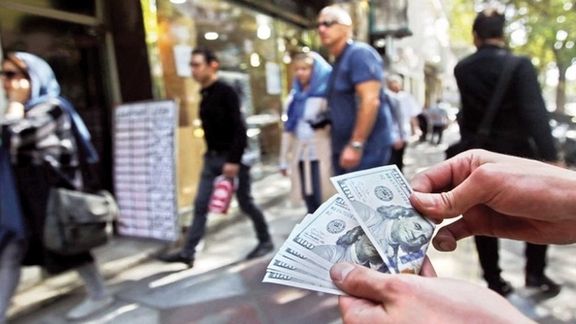
An Iranian trade official has confirmed the massive outflow of capital from the Islamic Republic, which many blame for the recent massive fall of the national currency rial.
Head of Tehran Chamber of Commerce, Industries, Mines and Agriculture Masoud Khansari said in an interview with ILNA website in Tehran on Monday that the annual outflow of capital has reached about $10 billion.
The Central Bank of Iran issued a statement January 3 saying that only from March 21 to June 20 $10 billion capital was sent abroad.
Noting that the social and economic conditions of the country have become difficult, he said that startups and new fintech can make up for the loss but in the current situation large numbers of experts and elites are emigrating from the country.
He mentioned Turkey as an example, saying that when the Islamic Revolution took place in 1979 the economies of these two neighbors were similar but now Turkey has surpassed Iran by at least $500 billion annually. Turkey’s gross domestic product is at $815.3 billion while Iran’s GDP is at $231.5 billion.
Khansari also maintained that the Islamic Republic’s inability to sell oil through normal channels has cost the country's economy more than $100 billion. His figure seems somehow odd as according to OPEC, Iran has lost more than $450 billion in income from oil sales in the past 10 years due to the sanctions.
According to a recent report by Iranian state media, at least $97 billion of capital exited the country’s economy in a period of 10 years up to March 2022.
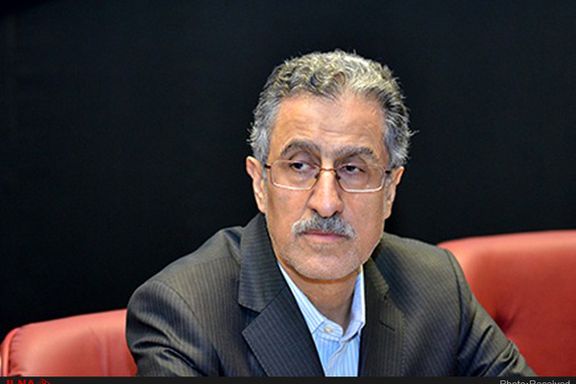
The constant outflow of capital shows a widespread and strong distrust of the Islamic Republic’s economic and even its political stability. Many of the people sending their money out of the country could be the very regime insiders who profit from their political connections to make large financial gains.
Iran’s battered currency regained 10 percent of its value this week after a new central bank chief assumed office following a drop to historic lows in December. The US dollar hovers around 400,000 rials down from a high of 440,00 last week, a 10-percent gain for the Iranian currency that has fallen more than 10-fold since 2018. Even with the rise on January 1, the currency is still 30 percent lower than in August and almost 50 percent less than in mid-2021, when the current hardliner president Ebrahim Raisi was elected and appointed other hardliners to top positions.
The new central bank chief Mohammad-Reza Farzin announced the bank’s “appropriate intervention” in the market as he began his first official day at work on December 31, without explaining why the rial has fallen to unprecedented lows.
During the cabinet meeting where Farzin was appointed, President Ebrahim Raisi stressed the importance of controlling the value of foreign currencies, asking the central bank chief to “manage” the situation.
An official during the presidency of Mahmoud Ahmadinejad, Farzin has made obscure promises to control the falling currency but the devaluation of the rial does not seem to be the result of only temporary factors that could be managed. The country’s economic system is corrupt and nepotistic, and only a selected few elites have access to cheap dollars that the government provides. Every now and then the government injects dollars into the free market to upend the chain of supply and demand but considering the sanctions that hinder the free flow of petrodollars into the country, every remedy proves to have a temporary effect.
Rial’s current wave of decline began in early 2018 when the United States decided to withdraw from the Obama-era nuclear accord with Iran, known as the JCPOA and impose ‘maximum pressure’ sanctions. The country’s oil exports, its economic lifeline, and international banking came under US third-party sanctions, meaning that any company or country violating the restrictions could itself come under US sanctions.
The rial which was then around 34,000 to the dollar began to fall, with the government forced to offer cheap foreign currency to importers of essential goods, to protect people from an inflationary shock. The government’s fixed-rate 42,000 rials for one dollar soon became a source of abuse by people who claimed to be importing essential goods, like food or raw materials, and instead imported luxury cars or simply turned around and sold the cheap dollars on the free market making huge profits.
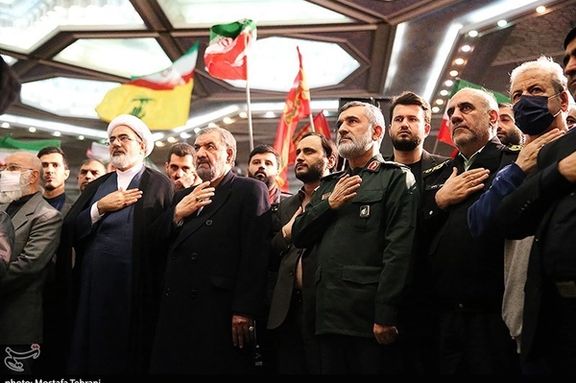
The Iranian Foreign Ministry says the US killing Qassem Soleimani. former commander of IRGC's Quds Force in 2020 failed in bringing Washington its desired outcome.
In a tweet on Tuesday, the foreign ministry claimed Iran continues “to play a decisive role” in the region and the United States’ “footprint in West Asia continues to diminish”.
The tweet was published on the eve of the third anniversary of Soleimani’s killing by the United States.
On January 3, 2020, the US military, on the order of President Donald Trump, killed Soleimani in a drone strike near Baghdad International Airport, saying that he had been "actively developing plans to attack American diplomats and service members in Iraq and throughout the region."
In a Monday statement, the Iranian regime also claimed that Washington conducted the killing of Soleimani with "false claims and pretexts, including under the guise of counter-terrorism" and in "naked violation of the tenets and principles of international law."
Iranian Foreign Minister Hossein Amir-Abdollahian said on Sunday that nearly 60 US officials have been blacklisted by Tehran for their involvement in the assassination of Soleimani.
Iran’s President Ebrahim Raisi and Supreme Leader Ali Khamenei have time and again vowed revenge for the killing of Soleimani.
Raisi in a speech on Tuesday addressed the US saying, “We have not forgotten martyr Soleimani’s blood and will never forget. They [Americans] should know that revenge for Soleimani is certain and his killers…will not have any peaceful sleep.”
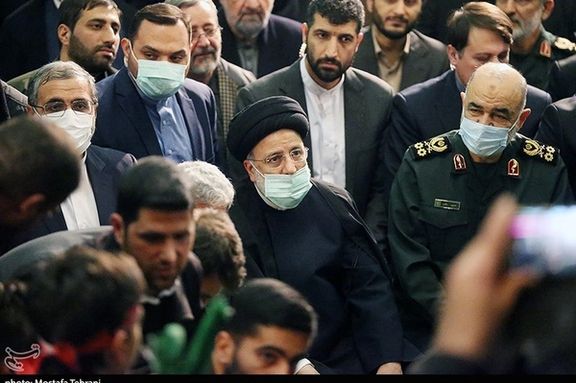
At the same time, many Iranian regime opponents and activists on social media celebrated Soleimani’s killing anniversary, calling it a “Cutlet Day”, after a popular Iranian dish made of ground beef and potatoes. Soleimani’s body was so mutilated in the attack that his detractors came up with the comparison to the meat and potato patties.
Some activists said that if Soleimani was alive he would have ordered a more brutal response to the current protests and would have had no reservations about killing thousands of people. They accused him of playing such a role in past protests and engineering Iran’s bloody military intervention in Syria against anti-Assad rebels, when hundreds of thousands of people were killed, injured and left homeless.
Protesters in Iran burned many banners erected in Soleimani’s honor this week and set fire to several of his statues.
A member of Iranian Revolutionary Guard was charged in August with planning to assassinate John Bolton, the former United States National Security Advisor in what the US Justice Department called “retaliation for the death of Iran’s Islamic Qasem Soleimani”.
Former Secretary of State Mike Pompeo was also told by the Justice Department that he was a second target of the plot.
Soleimani, who was Iran’s top military and intelligence operator outside its borders, was in charge of supporting and organizing militant proxy forces, including the Lebanese Hezbollah and Iraqi Shiite militia groups that have repeatedly attacked US forces.
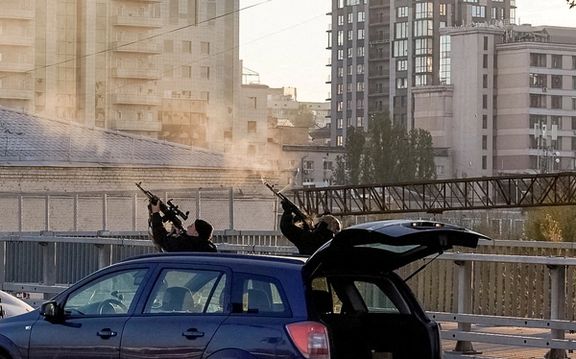
Ukrainian President Volodymyr Zelenskyy says Russia is planning prolonged attacks on the Ukrainian territory using Iranian Shahed kamikaze drones.
"We have information that Russia is planning a prolonged attack with 'Shaheds.' Its bet may be on exhaustion. On exhaustion of our people, our air defense, our energy sector... Now is the time when everyone involved in the protection of the sky should be especially attentive," Zelenskyy said in a video message Monday evening.
He asked everyone to brace themselves "to do everything so that this goal of the terrorists fails, like all the others."
According to the official statement by Ukrainian government, over 80 Iranian drones have been shot down by the country’s air defenses just in the past few days, and the number could increase in the coming weeks.
Since early October, the energy infrastructureacross Ukraine has been attacked repeatedly by Russian missiles and drones, resulting in dozens of casualties and disruption in water and power supplies.
Iran has denied supplying weapons to Russia for its war in Ukraine, but foreign minister Hossein Amir-Abdollahian after earlier denials acknowledged in early November that Tehran had supplied drones to Moscow “months before” the Ukraine war, leaving it vague if these were used in the war.
The United States and its European allies have strongly objected to Iranian drones for Russia, imposing sanctions move, and keeping nuclear talks with Tehran dormant.